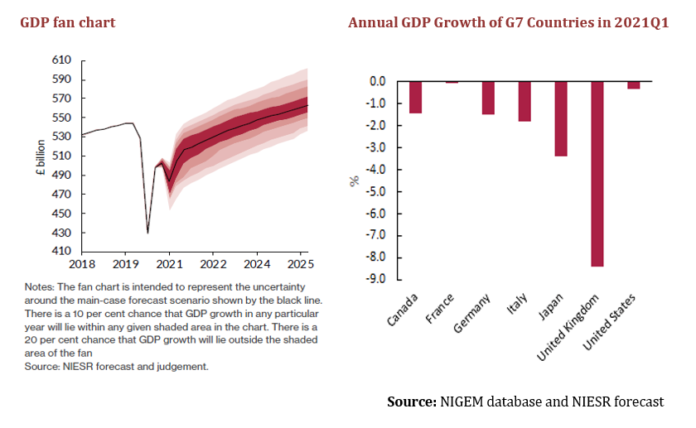The resurgence of Covid-19 has led to a downward revision in forecasts of UK economic growth in 2021 made by the National Institute of Economic and Social Research (NIESR).
The Thinktank has downgraded economic growth from 5.9% to 3.4%, following a contraction of 9.9% in 2020.
Early indications are that the lockdown in the first quarter is having a larger impact on activity than in November, but a smaller impact than the Spring 2020 lockdown say researchers.
The Job Retention Scheme (CJRS) and the Self-employed Income Support Scheme (SEISS) have protected millions of jobs, costing the government an estimated £100 billion or 4.8 per cent of GDP, for the 20-21 fiscal year.
In NIESR’s main-case forecast scenario, unemployment is expected to rise significantly following the end of these schemes in April, reaching 7½ per cent or 2½ million people by the end of the year.
The forecasters say that to prevent a rise in unemployment of the magnitude of the forecast, and to limit the economic and social ‘scarring’ from the public health crisis, the Chancellor should soon announce policies to support the labour market beyond April.
The pace and path of the recovery will depend on state-contingent and targeted policy interventions.
The Budget, they add comes at a crucial time in the fight against Covid-19. If Covid-19 support is withdrawn prematurely, or if consolidation is prematurely applied in response to the increase in public debt, the economic recovery will be delayed and the long-term economic impact of the pandemic exacerbated.
Meanwhile they add that there are major risks to the downside associated with the roll-out and effectiveness of vaccines, the emergence of new Covid-19 strains and their effect on the path of the virus, which might imply the continuation of lockdown measures for a longer period, suppressing domestic demand.
The recovery is forecast to be relatively stronger in the production industries, construction and finance and relatively weaker in the public sector, real estate and private traded services.
The effects of COVID-19, together with Brexit, continues to burden regional economies in the UK. There is severe downturn across all regions, followed by protracted and slow recovery, as well as long term scarring.
NIESR Deputy Director, Dr Hande Kucuk, said: “Despite the roll-out of vaccines, Covid-19 will have long-lasting economic effects. By 2025, the level of GDP is forecast to be around 6 per cent lower compared with pre-Covid19 expectations, reflecting lower consumption caused by higher unemployment, weaker business investment due to stressed balance sheets and uncertainty during the pandemic, and the adoption of a Trade and Cooperation Agreement with the EU which imposes more barriers to trade than before.”







